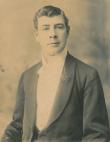English-born comedian, comic singer, film and radio actor, songwriter, poet.
Described by Frank Van Straten as a ''a genial, robust knockabout comedian' who was 'equally at home in the role of a pantomime dame' (Companion to Theatre in Australia, p.91), Fred Bluett is considered one of the leading comedians to work the Australasian circuits during the first three decades of the twentieth century. He was particularly noted for his original comic songs.
The son of London music hall artists, Bluett left England for Australia in 1892 and soon afterwards began developing his craft in Melbourne with several amateur minstrel companies while also working as a bootmaker. He travelled to New Zealand with the Ada Juneen company in July 1898 and following its demise two months later managed find work with John Fuller Snr in Auckland. Such was his popularity with New Zealanders Bluett later secured an 18 months contract with the Fullers. He came back to Australia in 1901 with them but left in 1902 to join Harry Rickards' Australasian circuit. Bluett remained with his company for some ten years, albeit with short breaks to work for other firms and occasionally mount his own shows.
In 1909 Bluett began performing with his five year old son, Gus. The pair found popularity in South Africa and England as both solo artists and partners between 1913 and 1916. After returning to Australia they continued this arrangement until Gus joined J.C. Williamson's. Fred Bluett in the meantime continued to tour as a solo comedian. In 1926, he briefly teamed up with Roy Rene as Bluett and Mo. The pair also worked together in the George Marlowe pantomime Aladdin (Grand Opera House, Sydney, 1926).
During his career Bluett worked for many leading variety firms and high profile troupes. In addition to John Fuller and Sons and Harry Rickards these included John N. McCallum (Brisbane), Humphrey Bishop's Comedy and Operatic Company; J.C. Williamson's Ltd, Harry Rickards' Tivoli Theatres, Fullers' Theatres, Leonard Davis (Perth), Ted Holland (Brisbane), Harry Clay (Sydney), and Dix-Baker (Newcastle). He also starred in the 1917 silent film, An Interrupted Divorce, and was cast in the role of Hollis in Norman Dawn's talkie feature Showgirl's Luck (1931). He also featured in Ken G. Hall's Cinesound Varieties (1934). Bluett made his radio debut in 1924 and from the early 1930s was heavily involved in the medium as an actor, performer and host.
Fred Bluett died in his sleep a few hours after recording an episode of the radio drama, Searchlights Over London.
 1164930427472808762.jpg
1164930427472808762.jpg
 1164930427472808762.jpg
1164930427472808762.jpg